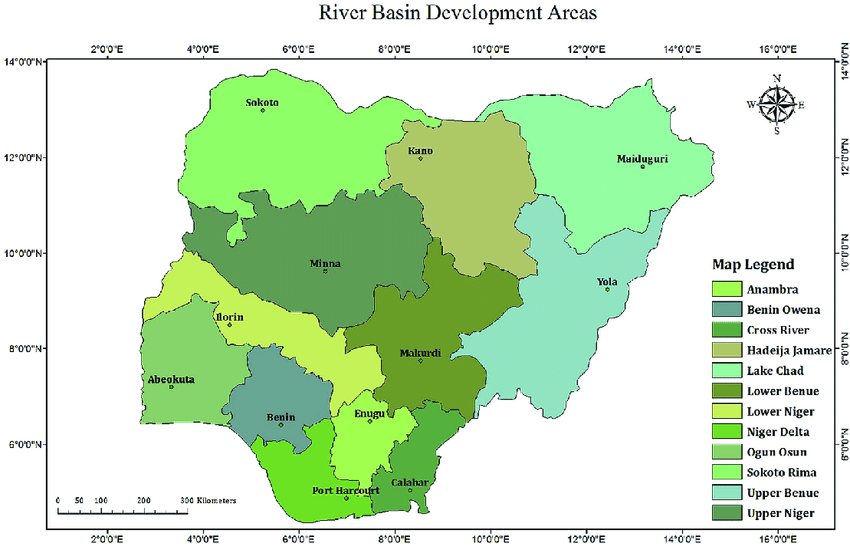T: +2347051423739

Nigeria River Basin Systems and the Nigeria Blue Economy –
A basic understanding of the history of the earth formation might be essential for appreciation of how we inherited a surface that is not flat nor friendly, an undulating surface with gorges, valleys, hills, lakes, the many rivers and tributaries. At one point, everything was submerged under water, gradually, the water receded, found its level with the largest pool constituting the oceans, the seas, the lakes with the drainage creating rivers, streams, valleys that are now the river basins – defined to be the area of land drained by river and its tributaries; geographical areas within the watershed limits of a system of rivers and converging towards the same terminus that could be a sea, lakes or sometimes an inland water body.
During much of the 20th century, the water needs of the growing population were met through the construction of infrastructure such as dams and reservoirs to manage water withdrawal from rivers. Water was thought to be abundant and impact on the environment was incremental, little, innocuous at first. Today, water resources in many rivers are fully committed to a variety of human uses, portable water quality is degraded, river-dependent ecosystem are threatened and the expanding demand for water is leading to competition and even to strife at times.
Today in Nigeria, management of water for irrigation and gracing is a major political conflagration point. In agriculture the challenge for water management is to maximize agricultural production with less water from river basins that are already stressed while judicious assessment of new water infrastructures are needed in open water basin. Thousands of years ago, efforts to control rivers were initiated and the concept of river basins as units for planning, developing and managing water emerged in the late 19th and early 20th centuries with multipurpose development of river basin focused primarily on construction of large dams during the second halve of the 19th century which increased from 5000 in year 1950 to 45000 in year 2000. River systems are interconnected transfer and transport systems (Newson, 1997) carrying water, sediment, nutrients contaminants and biota across space and time. In Nigeria, control of water, estimation of extreme events and management of animal variability posed many problems unanticipated by engineers (Sneddon, 2002). Human activities and intervention in the water cycle placed many river basins under stress. Basin uses need to be well coordinated and it is a logical system to use water resources development as an integrating social, economical and environmental condition throughout the basin (kraezel, 1957). In moving towards sustainable river basin management, there was a growing interest in institutional processes that can bring together fragmented water users into an integrated planning, allocation and management framework.
There are over eighty major rivers in Nigeria and the biggest among these include; River Niger which has its sources from Equatorial Guinea and River Benue. River Benue drains to join the Niger at Lokoja the confluence town, together, they drain into the Atlantic Ocean. As they journey down to the Atlantic Ocean, they are joined by other tributaries at the South South region. It then form the Niger Delta – geographically, the Niger Delta region; Delta State, Bayelsa State and River State. The other major rivers in Nigeria include; Gongola, Calaba, Osun, sokoto, Ogun, Kaduna. The ones that drain into river Niger include; Sokoto, Zamtara, Ka, Malendo, Kontagoa, Kaduna, Bakosi, Oli, Tesi, Oshin, Oyi, and Mim river. While the rivers that drain into river Benue include; Yedseram, Kilunga, Ruhu, Gongola, Gaji, Wase, Sheman, Guma, Mada and Daudau river (see map).

These Nigeria River basins provide numerous benefits to the people like drinking water provision, portable water to many rural areas of the country. These river basin systems also play a role in ground water recharge through seepage, good fossil reserve, chronological measurement, transportation and navigation. People travel from one place to another through the river system. It provides Hydro-electric power through construction of dam along a water fall in a river system for generation of electricity such as Kanji dam on the river Niger. River basins serve as an end point to water run-off in cities and town to control erosion, collects and store inland water run-off from rainfall, help to manage and control flooding Rivers flow into oceans and help recharge the system. More than three quarter of the river basins drain into Atlantic Ocean.
The evidence is Nigeria is enriched with numerous river basin systems and the river basin resources should be properly and sustainably harnessed to mitigate the overarching challenge of encroaching climate induced desertification and the parallel inadequacy of transport infrastructure necessary for economic growth of the nation. The Nigeria blue Economy initiative envisages a comprehensive integrated transportation policy that would use the river basins, the inland waterways systems as transportation tributaries, as natural arteries inland from the Atlantic Ocean to move goods and people in a manner that will ease or abate the current carnage on our roads.






